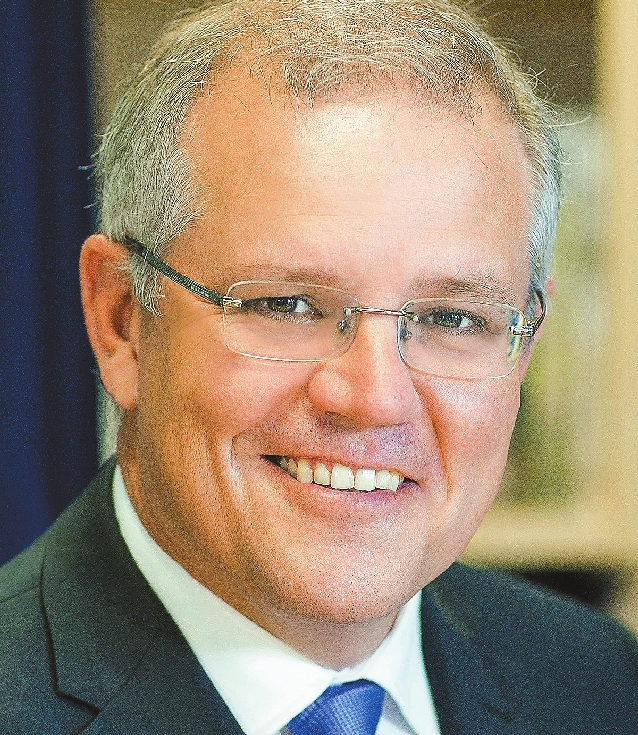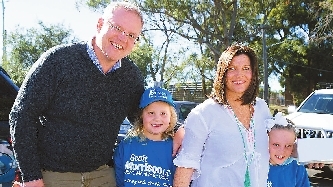

AUSTRALIA’S ruling coalition was widely expected to be defeated in the federal election after long trailing in opinion polls. But somehow, after just nine months as prime minister, Scott Morrison hailed a “miracle” victory. In doing so, he defied a perception in Australian politics that leadership turmoil can only spell electoral doom. The 51-year-old Morrison vowed to get “back to work” after the election. “I have always believed in miracles,” Morrison said to a cheering audience of Liberal supporters in Sydney on Sunday, shortly after he had received a phone call from Labor Party leader Bill Shorten conceding defeat. Shorten announced he would stand down as Labor leader while staying in parliament, adding the federal election campaign had been “toxic at times” but that Labor had fought for ambitious change. The prime minister said the election was a victory for the “quiet Australians” rather than about the Liberal Party or himself. “Tonight is about every single Australian who depends on their government to put them first,” he said. “That is exactly what we are going to do. Our government will come together after this night and we will get back to work. That is our task and that is my undertaking to Australians from one end of the country to the other. I said I was going to burn for you and I am — every single day.” Behind the miracle was an almost faultless campaign — and a devoted family. Since the brutal ouster of Malcolm Turnbull last August, Morrison has set about a disciplined strategy. Throughout the campaign, Morrison was front and center. Morrison made this election about him, and his ability to be the trustworthy, daggy-dad Australia needed. His ministers were rarely seen as Morrison took it upon himself to explain the coalition’s policies and vision for a third term. It was effectively a one-man show. And behind the scenes, three “quiet Australians” in particular helped in his “miracle” victory — his wife, Jenny, and two daughters Abbey and Lily. They were there at every step of the election campaign, providing him with support and establishing him to the Australian public as a devoted family man. Morrison and Jenny are high school sweethearts, having met when the pair were both 16 in Sydney’s southern suburbs — where they both grew up. Jenny suffered endometriosis. After multiple rounds of failed in vitro fertilization treatments, Jenny fell pregnant naturally at the age of 39 with Lily and then again with second daughter, Abbey, also naturally. Before entering parliament, Morrison was a man who approved Tourism Australia’s “So where the bloody hell are you?” campaign. In politics he rose as a tough immigration minister, proud of his record in preventing boats of asylum seekers from reaching Australia, arguing it prevented drownings. But when he became prime minister, he knew he had to change tack. A social conservative and devout Christian, Morrison pitched himself to voters as an everyday family man the country could trust. He embraced the nickname “ScoMo” and slapped on a baseball cap at any opportunity, providing the Internet with easily made fun. He also made folksy pitches such as “a fair go for those who have a go” and often introduced people with the words “how good is.” After his victory Sunday, the mantra was “How good is Australia!” His efforts to project authenticity had sometimes appeared awkward, such as in a social media video where he sat, manspreading on his desk, deriding the “Canberra bubble” around him. But though it drew ridicule, the strategy probably worked with many voters, according to Dr. Andrew Hughes, a political marketing expert from Australian National University. “He was able to successfully appeal to the middle family segment in marginal seats with a more wholesome ‘dad’ brand image.” According to opinion polls, the toppling of Turnbull caused an immediate drop in support for the Liberal-National government. But in the months since, polling showed the gap closing. The same canvassing also showed that Morrison was consistently favored over Shorten as preferred prime minister. That perception became central to Morrison’s strategy to divert attention from the government’s bitter divisions over issues such as climate change and energy policy. While Shorten talked up his team approach, the prime minister painted the election as a choice between himself and the opposition leader. He also sharpened his attacks. A telling moment took place in the final leaders’ debate when the men were told to ask each other two questions. Shorten used both to promote Labor policies; Morrison used his to criticize Labor policies. Morrison’s individual performance in the campaign was a success despite a lack of policies, said Prof. Anne Tiernan of Griffith University. “The range of [government] talking points has been so limited by virtue of the many of the legacies that brought to him to the prime ministership,” she said. Morrison instead pushed the economy — traditionally his party’s perceived strength — to the center of his campaign. He promised that his government would deliver better times ahead, while arguing that Labor would make people less prosperous. Shorten bet big on public sentiment to tackle climate change, and a wide-ranging reform agenda. But his message failed to cut through, particularly in Queensland, a large state with many conservative voters and disparate concerns. Morrison won numerous seats in Queensland after campaigning heavily there with a focus on job creation. Notably, he recorded big victories in electorates near a proposed coal mine which is to be built by Indian company Adani. The mine in Carmichael has been hugely divisive in Australia. It has drawn fierce opposition from environmental activists, but many locals want it because it will guarantee jobs. The government supports the mine, whereas Labor has given mixed signals. The state was crucial to his victory, and Morrison singled it out for thanks in his victory speech: “How good is Queensland?” As awed Australian pundits declared Morrison a campaigning “legend,” U.S. President Donald Trump got in on the act, sending a congratulatory tweet. The two men spoke by phone after the results came in, vowing “close cooperation on shared priorities,” according to a White House account of the call. Trump’s allies will be quick to claim Morrison’s win as another victory in the global march of populism. Despite his high political stock, Morrison may face a rocky three-year term. First, he will have to contend with a challenging economic outlook and figure out how to pay for a budget based on improbable growth forecasts. After almost three decades of robust economic growth, Australia’s economy is showing signs of stalling. The central bank is widely expected to cut interest rates when it meets next month, in a bid to counter a housing market dip, stagnant wages and a weakening labor market. Morrison finds himself in the unusual position of having made few promises to the electorate beyond extending tax cuts. His campaign was relentless and disciplined — appearing on the stump before voters day-after-day to warn that Labor would tax voters into oblivion and that Shorten could not be trusted. Enough Australians agreed, offering a clear rebuke of Shorten and his policies. But it is less clear what they voted for. In coal-rich Queensland, voters backed new mining projects that would bring jobs, but which are fiercely opposed in much of the rest of the country. The divisions within Morrison’s Liberals were already clear to see Sunday, with right and centrist factions racing to fill the policy void. Some demanded an immediate loosening of rules on fossil fuel exploration, while moderates hinted at a rethink of the party’s climate scepticism. “I have to say to you on climate change, it is real. We take it very seriously,” said Morrison’s deputy, Treasurer Josh Frydenberg.(SD-Agencies) | 
